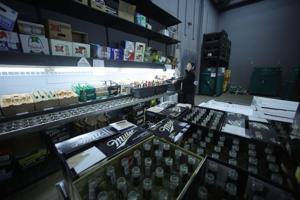Top Stories
Moosehead Ends Bottle Beer Production, Cans Take Over Industry

BREAKING: Moosehead Breweries has announced it will cease production of bottled beer by early 2024, a significant shift in the Canadian beer landscape. This decision reflects a larger trend within the industry as consumer preferences increasingly favor canned beverages over bottles.
UPDATE: Andrew Oland, president of Moosehead and a sixth-generation family leader, shared his sentiments on the move, stating, “The green bottle has been such a part of Moosehead’s history and success.” However, he acknowledges that the industry dynamics have shifted dramatically, with bottled beer sales plummeting from 86 percent of the market four decades ago to just 14 percent today, according to Statistics Canada.
The transition towards cans is fueled by multiple factors, including cost efficiency and convenience. Canned beer is lighter, easier to store, and more efficient to ship, making it a preferred choice for retailers like the LCBO. Greg Taylor, co-founder and CEO of Steam Whistle Brewery, remarked that bottles are three times more expensive to produce than cans. “The LCBO wanted to see the industry head in that direction,” he stated, highlighting the strong push for canned products.
The emotional connection to bottled beer cannot be overlooked. Many beer enthusiasts cherish the tactile experience and nostalgia associated with glass bottles. Stephen Beaumont, a beer author, noted that the perception of bottles as a superior package has changed over the years. “There’s a romance and nostalgia about glass,” he said, despite the industry’s movement toward cans.
Research also indicates that consumer preferences are evolving. A 2016 study from the University of Oxford found that people tend to enjoy the taste of beer served from bottles more than from cans. However, the scientific realities of beer packaging may soon tip the scales further in favor of cans. Bottles can allow UV light to spoil the beer, leading to a skunky flavor, a risk that cans avoid entirely.
As Moosehead prepares for this transition, other breweries are also reassessing their packaging strategies. While some, like Steam Whistle, continue to embrace bottles due to their brand identity, the trend is clear: cans are becoming the dominant force in the beer market. “We’re hoping that we’re going to see the consumer shift back to the bottle,” Taylor noted, though he acknowledged the uphill battle against the growing popularity of cans.
The implications of this shift extend beyond mere packaging preferences. With Moosehead leading the way, the beer bottle’s future is uncertain. Experts predict that while major brands may retain bottled options for special releases, the everyday consumer may soon view bottles as a rarity.
As Moosehead’s bottle production phase out looms closer, fans of bottled beer face a bittersweet reality. Oland’s parting words resonate with many: “It’s not the end. They’re just going to become rarer and rarer.”
The industry is watching closely as this change unfolds, with the potential for widespread implications on consumer experience and market dynamics. What will this mean for the future of beer drinking in Canada? Only time will tell, but one thing is clear: the age of the beer bottle may soon be a chapter in history.
-

 Politics4 weeks ago
Politics4 weeks agoSecwepemc First Nation Seeks Aboriginal Title Over Kamloops Area
-

 World5 months ago
World5 months agoScientists Unearth Ancient Antarctic Ice to Unlock Climate Secrets
-

 Entertainment5 months ago
Entertainment5 months agoTrump and McCormick to Announce $70 Billion Energy Investments
-

 Science5 months ago
Science5 months agoFour Astronauts Return to Earth After International Space Station Mission
-

 Lifestyle5 months ago
Lifestyle5 months agoTransLink Launches Food Truck Program to Boost Revenue in Vancouver
-

 Technology3 months ago
Technology3 months agoApple Notes Enhances Functionality with Markdown Support in macOS 26
-

 Lifestyle3 months ago
Lifestyle3 months agoManitoba’s Burger Champion Shines Again Amid Dining Innovations
-

 Top Stories2 months ago
Top Stories2 months agoUrgent Update: Fatal Crash on Highway 99 Claims Life of Pitt Meadows Man
-

 Politics4 months ago
Politics4 months agoUkrainian Tennis Star Elina Svitolina Faces Death Threats Online
-

 Sports5 months ago
Sports5 months agoSearch Underway for Missing Hunter Amid Hokkaido Bear Emergency
-

 Politics5 months ago
Politics5 months agoCarney Engages First Nations Leaders at Development Law Summit
-

 Technology5 months ago
Technology5 months agoFrosthaven Launches Early Access on July 31, 2025




















